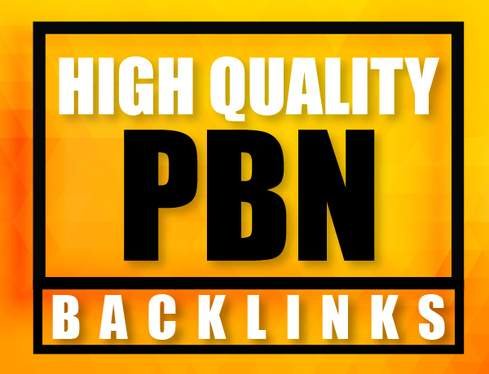What is a PBN?
A Private Blog Network (PBN) is a network of websites that are controlled by an individual or organization with the primary purpose of building links to other websites (usually their main “money site”) to manipulate search engine rankings. The websites within the PBN are usually older domains that have expired or been repurposed after accumulating some authority or backlinks of their own.
The key to a successful PBN is making it appear like a collection of legitimate websites with original content, rather than a group of sites designed purely for backlinking. The better disguised a PBN is, the more effective the backlinks can be in helping a target site rank higher in search results.
How Do PBN Backlinks Work?
PBN backlinks work similarly to natural backlinks, except they’re created artificially through the network. By linking out from these high-authority PBN sites to your target website, you can improve your site’s authority and relevance in the eyes of search engines. In turn, this can boost your rankings for specific keywords, driving more organic traffic to your site.
The power of a PBN backlink comes from the authority of the domains within the network. By using high-quality expired domains, you can simulate the effect of earning a natural backlink from a trusted source. However, search engines like Google have systems in place to detect and penalize sites that use PBNs improperly, which is why it’s important to approach buying PBN backlinks with caution.
Why Do People Buy PBN Backlinks?
Buying PBN backlinks is popular because it can be a quicker way to improve rankings compared to waiting for natural backlinks to accumulate. For many website owners, the allure of faster results, increased traffic, and improved domain authority outweighs the potential risks. However, as we’ll explore later, buying PBN backlinks comes with its fair share of challenges and potential downsides.

The Pros and Cons of Buying PBN Backlinks
Like any SEO strategy, there are both advantages and disadvantages to using PBN backlinks. Before you make a decision to buy PBN backlinks, it’s essential to weigh these pros and cons to determine whether this strategy aligns with your business goals and risk tolerance.
The Pros of Buying PBN Backlinks
- Faster Results
One of the biggest advantages of buying PBN backlinks is that they can yield faster results compared to waiting for organic backlinks. Building a natural link profile takes time and patience, whereas PBNs allow you to gain backlinks from established domains almost immediately. - Control Over Your Link Profile
When you buy PBN backlinks, you have complete control over where the links come from, the anchor text used, and the pages being linked to. This level of control can be beneficial for businesses looking to target specific keywords and pages without relying on third-party sites or natural link-building efforts. - Cost-Effective in the Short Term
While building natural backlinks can be expensive and time-consuming (especially if you’re relying on outreach or content marketing), buying PBN backlinks can be more cost-effective in the short term. You pay for a direct boost in rankings rather than spending time creating content or forming relationships with site owners for guest posts.
The Cons of Buying PBN Backlinks
- Risk of Penalties
Google’s algorithms are designed to detect manipulative tactics, including PBN backlinks. If your PBN is discovered, your website could be penalized, leading to a loss of rankings or even being de-indexed from search results. Once your site is penalized, it can take significant time and effort to recover. - Short-Term Gains, Long-Term Uncertainty
PBN backlinks might provide a quick boost in rankings, but they rarely result in sustainable, long-term SEO success. Search engines continually update their algorithms to weed out manipulative strategies, meaning the PBN links that are effective today might lose their value tomorrow. - Quality Concerns
Not all PBNs are created equal. Some sellers offer poorly managed networks with low-quality domains, which could harm your site more than help it. When buying PBN backlinks, you must be extremely careful about the quality of the network you’re investing in, as low-quality links can do more damage than good.
How to Buy PBN Backlinks Safely: Best Practices to Minimize Risks
Buying PBN backlinks can be risky, but there are ways to minimize those risks by following best practices and making informed decisions. Here’s how you can safely navigate the world of PBN backlinks.
1. Evaluate the Quality of the PBN
Before purchasing backlinks, thoroughly vet the PBN to ensure it’s high quality. Here are some factors to consider:
- Domain Authority: Check the domain authority (DA) or domain rating (DR) of the sites in the PBN. Higher DA/DR sites tend to have more influence over search rankings.
- Backlink Profile: Analyze the backlink profile of the PBN domains. Ensure that the domains themselves have a clean backlink profile with a mix of authoritative links.
- Content Quality: The content on the PBN sites should be relevant, high-quality, and regularly updated. If the content looks spammy or low-effort, it could be a red flag.
2. Diversify Your Link Profile
While PBN backlinks can provide a quick boost, they shouldn’t be the only links pointing to your site. Diversify your backlink profile by earning links from natural, high-authority sources like guest posts, directory listings, and partnerships. A diverse backlink profile looks more natural and reduces the chances of being flagged by search engines.
3. Use Proper Anchor Text Strategy
When buying PBN backlinks, the anchor text you choose is crucial. Over-optimization of anchor text (i.e., using exact-match keywords for every backlink) is a common mistake that can raise red flags with search engines. Use a natural mix of anchor texts, including branded terms, generic terms (like “click here”), and partial match keywords to make your backlink profile appear more organic.
4. Choose Reliable Sellers
Not all PBN sellers are created equal. It’s important to choose a reliable and reputable seller with a proven track record. Look for reviews, case studies, and testimonials from other clients to gauge the seller’s credibility. Ask about the safety measures they’ve put in place to ensure their PBN is not easily detectable by search engines.
PBN Backlinks vs. Natural Backlinks: What’s the Difference?
To fully understand the role of PBN backlinks in SEO, it’s essential to compare them to natural backlinks. While both types of links can boost your rankings, the methods and long-term effects differ significantly.
Natural Backlinks: The Gold Standard
Natural backlinks are earned organically when other websites link to your content without any intervention from you. These links are generally considered the gold standard in SEO because they’re a sign that your content is valuable, authoritative, and worth referencing.
Natural backlinks tend to come from various sources, including:
- Guest posts on high-authority blogs
- Media mentions in news outlets
- Social shares and viral content
- Partnerships with industry influencers
These links carry a lot of weight because they’re seen as an endorsement from a third-party source, and search engines reward websites that earn them.
PBN Backlinks: The Shortcut
In contrast, PBN backlinks are artificially created to manipulate search engine rankings. While they can be effective in boosting rankings quickly, they carry inherent risks because they don’t represent an organic endorsement of your content. If search engines detect that a site is using PBN links to boost rankings, they may penalize the site for using manipulative tactics.
Key Differences
- Source: Natural backlinks come from other website owners who genuinely want to reference your content. PBN backlinks come from sites that are specifically set up to pass link juice to your target site.
- Risk: Natural backlinks carry little to no risk, as they’re earned organically. PBN backlinks, on the other hand, come with the risk of penalties if they’re detected by search engines.
- Longevity: Natural backlinks tend to provide long-term SEO benefits, whereas PBN backlinks may lose their effectiveness over time as search engines update their algorithms.
How to Spot a Low-Quality PBN and Avoid Scams
With the increasing demand for PBN backlinks, the market has become flooded with low-quality networks and scams. Knowing how to spot a bad PBN can save you from wasting money or even harming your website’s SEO.
1. Check the Domain’s History
Before buying a PBN backlink, always investigate the history of the domain. You can use tools like the Wayback Machine or domain history checkers to see what the domain was used for in the past. Be cautious of domains that have changed ownership frequently or have been used for spammy purposes in the past.

